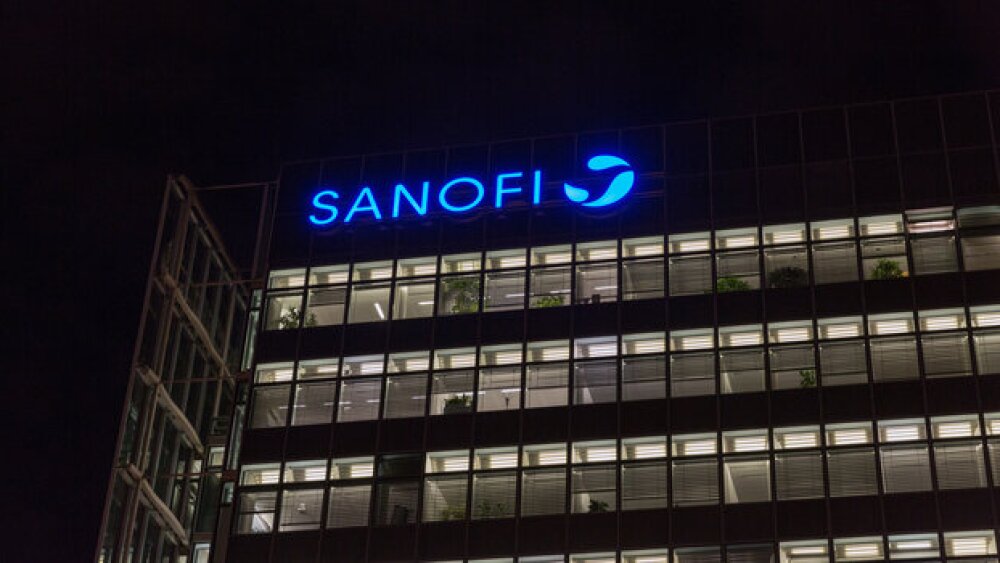Despite strong sales of its blockbuster drug Dupixent, Sanofi on Thursday reported that its fourth-quarter 2023 operating income dropped 5% due to a weaker U.S. dollar, high expenses and generic competition.
Pictured: Sanofi building in Germany with blue sign at night/iStock, Panama7
Sanofi on Thursday released its fourth-quarter and full-year 2023 results revealing an International Financial Reporting Standards net income loss of approximately $600 million, driven mainly by a weak U.S. dollar, high expenses and rising generic competition.
The French pharma’s business operating and net incomes took a hit, dropping 5.2% and 2.7% in the fourth quarter versus the same period the prior year. Operating expenses, meanwhile, grew 7.1% to around $5.19 billion.
Contributing strongly to the decline was Sanofi’s multiple sclerosis therapy Aubagio (teriflunomide), the sales of which dropped 74% to just over $130 million in the fourth quarter after its loss of exclusivity, according to the company’s presentation.
Still, the pharma posted positive growth for its net sales in the fourth quarter, raking in more than $11.8 billion, which represents 9.3% growth at constant exchange rates compared with the same period the prior year. Its full-year 2023 sales, which came in at around $46.6 billion, posted 5.3% growth from the previous year.
The blockbuster anti-inflammatory drug Dupixent (dupilumab) was once again Sanofi’s top-selling asset, netting approximately $3.23 billion in the fourth quarter with 31.3% revenue growth. Despite sustaining a 4% drop in sales, Sanofi’s portfolio of influenza vaccines brought in a combined $741 million and remains one of the company’s best-performing product categories.
Other high-performance assets in the fourth quarter of 2023 included Sanofi’s polio, pertussis and Hib vaccines, as well as its preventive antibody for respiratory syncytial virus Beyfortus (nirsevimab).
Looking forward to 2024, Sanofi and partner Regeneron are looking to boost Dupixent’s earnings further with a potential approval in chronic obstructive pulmonary disease (COPD). The companies posted data from the Phase III BOREAS trial in March 2023 and the Phase III NOTUS study in November 2023, showing that Dupixent could significantly reduce episodes of exacerbations in COPD patients.
Dupixent is also in Phase III studies for bullous pemphigoid, chronic pruritus of unknown origin, chronic spontaneous urticaria and eosinophilic gastritis, submissions for which are planned for 2025 and beyond.
Sanofi is also preparing to make a handful of regulatory submissions this year, including for tolebrutinib in relapsing multiple sclerosis and non-relapsing secondary progressive multiple sclerosis, fitusiran in hemophilia A and B and rilzabrutinib in immune thrombocytopenia.
On Thursday, Sanofi named François-Xavier Roger as its new chief financial officer, replacing Jean-Baptiste Chasseloup de Chatillon who will move on to lead a charity for children. Roger was most recently the financial head of Nestle, where he served for over eight years and drove the company’s “sustainable value creation,” according to the announcement.
Roger was also previously the CFO of Takeda and Danone Asia, and had worked for other pharma companies including Aventis, Roussel and Hoechst.
Tristan Manalac is an independent science writer based in Metro Manila, Philippines. Reach out to him on LinkedIn or email him at tristan@tristanmanalac.com or tristan.manalac@biospace.com.






